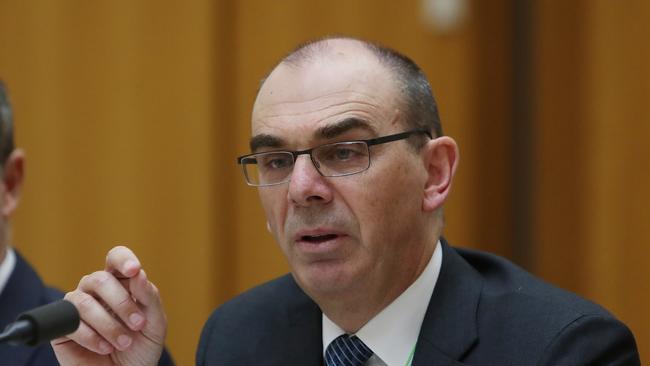APRA cracks down on banks buying back stressed mortgages
Lenders have been quietly buying back stressed mortgages packaged up as bonds and sold to investors, potentially in breach of prudential standards.

Some of the nation’s lenders have been quietly buying back stressed mortgages that have been packaged up as bonds and then sold to investors, which is potentially in breach of prudential standards, according to the banking regulator.
The move by the banks appears to be designed to help prop-up the nation’s $100bn-plus mortgage securitisation market during the COVID pandemic, but the banking regulator warned it could affect the functioning of the market.
The crackdown by the Australian Prudential Regulation Authority comes as Bank of Queensland and Westpac prepare to update the market on the state of their mortgage deferrals, with the banks scheduled to hold annual general meetings this week.
Bank of Queensland will front investors on Tuesday, while Westpac will hold its own annual meeting on Friday.
Westpac has already taken numerous hits from regulators this year, with APRA just days ago slapping it with enforcement action over its lax compliance and “material breaches” of prudential standards on liquidity.
It has also slammed its risk management practices, saying in a court-enforceable undertaking that new prudential problems were arising at the bank even while “longstanding weaknesses persist”.
APRA sent a letter to banks warning them against buying back stressed mortgages, which it said provided “implicit support” to securitisations.
It did not name the banks involved in the practice.
With the market representing more than $112bn, residential mortgage-backed bonds are packaged up and sold to investors.
This helps banks remove risk from their balance sheet. The securitisation market effectively froze in the wake of the GFC, with investors nervous about the health of loans sitting in portfolios. The domestic market has slowly returned back to life in recent years as interest rates have fallen and lending losses have remained low. However it remains below its pre-GFC peak of nearly $200bn.
“APRA has recently identified that some authorised deposit-taking institutions repurchased residential mortgage loans that were subject to repayment deferral from their securitisations,” the regulator said in the letter.
APRA said “this represents implicit support” which is “inconsistent” with the prudential standards. As Westpac prepares for what will likely be a fiery annual meeting, investors are awaiting an update on the latest loan deferral figures from the bank.

Currently Australia banks are sitting on $68bn of deferred mortgage loans. At the height of the crisis, which forced an economic shutdown that shook households across the country, Australian banks had deferred repayments on more than $170bn worth of mortgages.
But data released by the Australian Banking Association last month showed that the number of mortgage repayment holidays at the seven largest lenders had fallen by 66 per cent at the start of November.
As states gradually opened up in recent months, allowing people to get back to work and return to paying off their loans, the number of deferrals has fallen dramatically, with 170,000 recorded as at November 1, according to the ABA.
APRA in October warned that the level of impaired loans in the banking sector was understated, while capital ratios were overstated.
“We’re obviously watching deferrals very closely, and what we don’t know is how many of those deferrals are going to end up as impaired assets,” Mr Byres told an investment conference.
“We’ve probably passed the peak and there’s been a good, solid trend down now for a couple of months, as customers for the most part return to performing and making repayments on their loans.
“But we do know when we get to the end of the process there will be a number that aren’t able to do that and end up as impaired assets, so as we sit here today impaired assets are probably a bit understated — therefore capital is a bit overstated.”
The relevant section of the prudential standard states that an banks must, except in the case of a self-securitisation, not provide, or knowingly create or encourage a perception that it will provide, implicit support for a securitisation.
The regulator only allows lenders to repurchase mortgages from their securitisations under limited circumstances and if the borrower is in good standing.
“The intent of (the prudential standard) is that mortgages are not repurchased by ADIs if the borrower is in hardship or the loan is of lower quality, as this would undermine the principle of a clear transfer of credit risk that is at the heart of the regulatory treatment of securitisation,” the regulator said.
Following the breaches, the lenders involved will be required to disclose their buybacks as part of their reporting requirements.
They will also be required to have a third party review their compliance with the prudential standard and mitigate any findings prior to further securitisation issuance.
APRA also flagged a program of “securitisation thematic reviews” after it identified other issues in relation to compliance with the same prudential standard within the same lenders who contravened the rules. These reviews had begun and would continue into 2021, it said.
Deficiencies already identified by the regulator include a lack of oversight of ongoing securitisation operations and requirements for lenders to repurchase loans from their securitisations under certain circumstances.





To join the conversation, please log in. Don't have an account? Register
Join the conversation, you are commenting as Logout